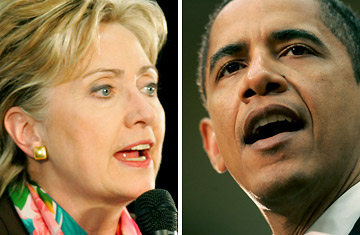
After one of the most negative weekends of campaigning so far this election, it's hard to know if either Barack Obama or Hillary Clinton will emerge from Tuesday's long-anticipated Pennsylvania primary looking much like a real winner.
The six weeks since the last Clinton/Obama one-on-one match-up have felt like an eternity to millions of voters and pundits, and not least because the candidates have used most of that time to take potshots at each other over a range of controversies: Obama's former minister's controversial comments, Clinton's exaggerations about landing "under sniper fire" as First Lady in Bosnia, the resignation of Clinton's top strategist after he consulted with the Colombian government on a free trade deal Clinton opposes, Obama's indelicate remarks regarding "bitter" rural workers who "cling" to guns and God. All of which culminated in a debate on ABC last week that was the most watched, and the most criticized, candidate encounter so far. Viewers, and presumably voters, may want substance over scandal, but the two campaigns just can't seem to resist going for the knockout punch.
Dozens of campaign e-mails have crisscrossed journalists' inboxes in recent days, accusing the other of going "negative." Obama devoted fully three-fourths of his speeches to outlining all the reasons why he, not Clinton, would make a better President. And Clinton, at a stop in Johnstown, accused Obama of cheering for G.O.P. presumptive nominee John McCain after he said that all three of them would make better Presidents than George Bush. The final day of campaigning saw Obama accuse Clinton of playing the "politics of fear" after she released a new ad featuring an image of Osama bin Laden and the lines "Harry Truman said it best — if you can't stand the heat, get out of the kitchen... Who do you think has what it takes?"
The conventional wisdom is still that Clinton will pull out a victory here; the key question is by how much. With Obama having outspent Clinton by a two-to-one margin in radio and TV advertising, Clinton's lead has shrunk from more than 20 percentage points six weeks ago to around 5 now, according to an average of Pennsylvania polls by the non-partisan website Real Clear Politics. A loss would almost certainly put an end to her struggling campaign, proving Obama can win big swing states that are crucial in a general election. But a single-digit win, less than her 10.5% margin of victory in Ohio, could do almost as much damage, showing slipping support among working-class white populations and making continued fund raising a real challenge. A convincing, double-digit Clinton victory, by contrast, means she continues on to the next round on May 6, when Indiana and North Carolina get their chance to play their role in the never-ending primary drama.
Both campaigns spent the weekend trying to downplay expectations. On Monday Clinton's campaign denied a claim on the website the Drudge Report that her own internal polling was predicting an 11-point victory. Neither side would forecast margins of victory or loss, but there is little doubt that Obama enters the primary with an easier goal: he only needs to limit the damage, whereas Clinton needs a decisive win. "He needs to do very well among middle- and upper-class voters in the Philadelphia suburbs," said Donald Kettl, a political science professor at the University of Pennsylvania. "Modest gains among white male voters would seal the deal. It's a tall order. But it's not impossible. The race has closed significantly in the last few weeks."
Obama has invested heavily in registering Democratic voters, helping to add 327,000 new Democrats in the Keystone State before registration closed a month ago — more than 65% of those in the 12 urban, Obama-friendly counties. A poll of the new voters found that 62% were planning to vote for Obama, and some analysts believe that the state's traditional polls may be skewed since they likely don't include these new Democrats. Following the strategy that helped Governor Ed Rendell (a vocal Clinton supporter) get elected twice, Obama is betting that he can actually win the state if he can snag more than half of the 12 big urban counties. When asked if Obama, who plans to spend "victory" night in Indiana, will win Pennsylvania, his communications director Robert Gibbs responded with a simple "No." "Look," he continued, "We came from 20 points behind." Are they without hope? "No, just realistic," Gibbs said.
As the primary battle has become increasingly nasty, some Democrats worry that voters are digging in their heels and contemplating staying home (or even voting for John McCain) in November if their first choice doesn't get the nomination. Obama supporter Janet Grossner, 57, a social services worker in Allentown, is certainly feeling the effect of that: on the morning after the ABC debate last week, she had a falling-out with one of her closest friends and colleagues, a Clinton supporter. Grossner, who describes herself as not terribly political, began vehemently defending Obama. "There's just so much bad blood between them," said Grossner, in jeans and a lime green sweatshirt, sitting in a waffle shop in Bethlehem, Pennsylvania an hour before Obama would arrive to shake hands down Main Street. "I worry about the party coming together after all of this." In other words, she worries, as many of her fellow Democrats do, that the true winner of the bruising Democratic Pennsylvania primary could already be John McCain.
